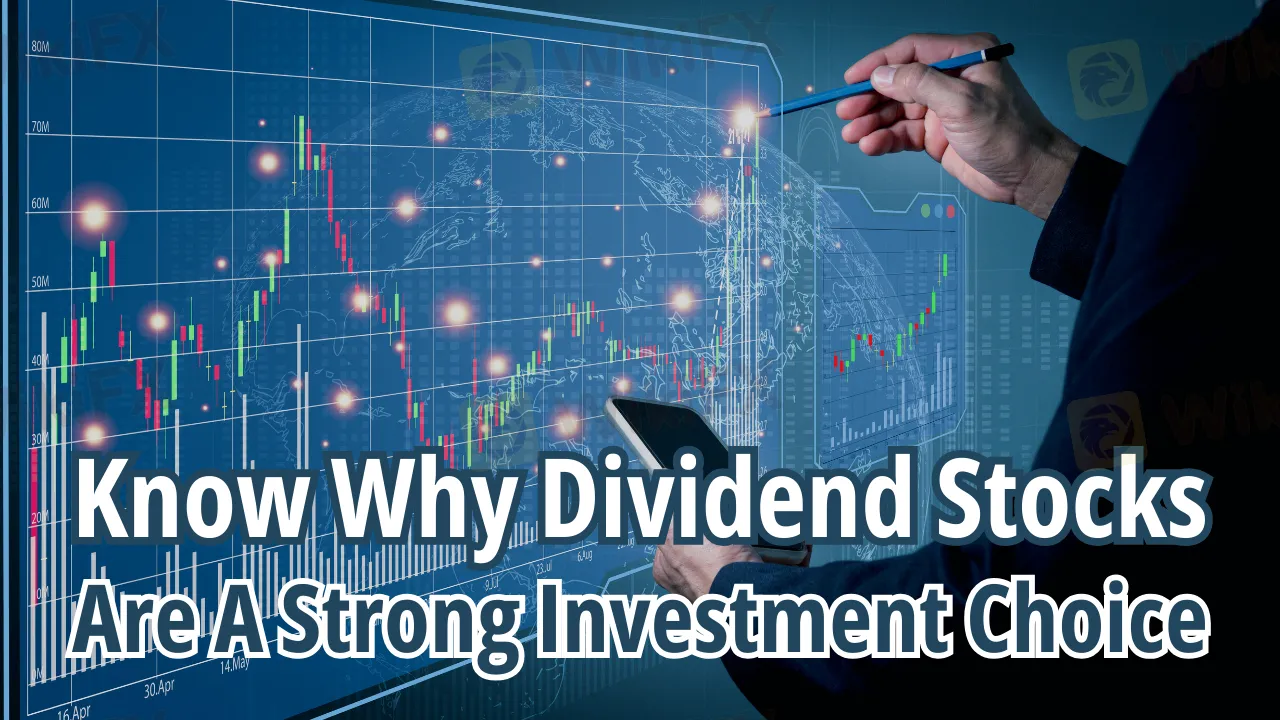简体中文
繁體中文
English
Pусский
日本語
ภาษาไทย
Tiếng Việt
Bahasa Indonesia
Español
हिन्दी
Filippiiniläinen
Français
Deutsch
Português
Türkçe
한국어
العربية
Know Why Dividend Stocks Are A Strong Investment Choice
Abstract:Explore the intricacies of dividend stocks, from high-yield options to tax implications. Dive deep into why they're a favored investment choice, offering a blend of income and growth.

Introduction
Dividend stocks have long been a popular investment option for many people. They provide an appealing mix of capital appreciation and consistent income. Understanding the subtleties of dividend stocks might be critical for anybody contemplating entering the stock market or altering their portfolio. So, let's get into it and address some of the most often-asked questions regarding them.
What are the best high-yield dividend stocks to buy now?
High-yield dividend companies pay out a greater dividend yield than other equities in the market. These are generally from well-established corporations with consistent earnings that enable them to pay out large dividends. Utilities and real estate investment trusts (REITs) are two examples. However, it is critical to do research and check that the high yield is not the consequence of a falling stock price.

What distinguishes Dividend Aristocrats from other stocks?
Dividend Aristocrats are S&P 500 firms that have increased their dividends for at least 25 consecutive years. These firms are seen as more stable and dependable, demonstrating the capacity to create regular profits throughout economic fluctuations.
Which firms have a track record of dividend growth?
As previously stated, several Dividend Aristocrats have continuous dividend increases. Procter & Gamble, Johnson & Johnson, and Coca-Cola are among them. Companies that consistently boost their dividends may be an indication of excellent financial health.

What is the ex-dividend date, and why is it significant to investors?
The ex-dividend date is the deadline for receiving the next dividend payment. If you buy a stock on or after this date, you will not be eligible for the next dividend. If dividends are important to you, timing your investments is critical.
What are Dividend Reinvestment Plans (DRIPs) and how do they work?
DRIPs enable investors to reinvest their dividends back into the company, generally without incurring any extra transaction costs. This may be an effective method for compounding interest and growing investment over time.

What are the tax consequences of getting dividends?
Dividends are categorized as qualified or unqualified. Non-qualified dividends are taxed at your regular income rate, but qualified dividends are taxed at your capital gains rate. To fully comprehend these ramifications, it is essential to contact a tax specialist.
Are there any trustworthy dividend-focused ETFs?
Yes, several ETFs specialize in dividend stocks. Vanguard Dividend Appreciation ETF and iShares Select Dividend ETF are two examples. These may provide investors with exposure to a diverse collection of dividend-paying firms.
What foreign stocks have the highest dividend yields?
Dividend yields are appealing in a variety of foreign firms and marketplaces. Companies in developed European markets, for example, have a long history of paying out large dividends. Before investing, always examine the financial health of foreign corporations and comprehend the region's political and economic context.

How can I assess a company's dividend's safety or sustainability?
Examine the company's payout ratio, which is the percentage of profits paid out in dividends. An extremely high payout ratio might be a red flag. Understanding a company's debt and cash flow may also provide insight into the sustainability of dividends.
In terms of income creation and risk, how do dividend stocks compare to bonds?
Dividend stocks and bonds may both provide income. Dividend stocks, on the other hand, have the possibility for capital appreciation, whilst bonds refund the principal at maturity. Stocks are more volatile than bonds, but they often give larger long-term returns.
Conclusion
Understanding dividend stocks and their complexities will help you make educated investing decisions. They appeal to many people because they provide a mix of income and possibility for development. However, like with any investment, it is critical to do research and keep current.
Consider downloading the WikiFX App for additional financial insights and news: https://www.wikifx.com/en/download.html.

Disclaimer:
The views in this article only represent the author's personal views, and do not constitute investment advice on this platform. This platform does not guarantee the accuracy, completeness and timeliness of the information in the article, and will not be liable for any loss caused by the use of or reliance on the information in the article.
Related broker
Read more

Top Reasons Why FXCM is Your Go-to-Broker for Forex Trading
A revered broker name is what you want to associate with being a forex trader. Fortunately, you have plenty of such names on WikiFx where the best forex brokers and regulators are listed to ensure your transaction is genuine. One such name is FXCM, a regulated forex broker in the United Kingdom (UK). Let’s check out more details about FXCM through this article.

Scammers Use AI to Fake Lim Guan Eng’s Support for Investment Scheme
A fake video showing former Penang Chief Minister Lim Guan Eng promoting an investment scheme has started spreading online. Lim has come forward to say the video is not real and was made using artificial intelligence (AI).

IronFX: A Closer Look at Its Licences
In an industry where safety and transparency are essential, the regulatory status of online brokers has never been more important. For traders seeking to protect their capital, ensuring that a platform operates under recognised and stringent oversight can make all the difference. Keep reading to learn more about IronFX and its licenses.

Spot vs Forward Contracts - Which Should You Choose?
Mulling foreign exchange contract options - Spot vs Forward - to begin or consolidate your trading journey? Read this comprehensive guide explaining the differences between spot and forward contracts. You can select better using it.
WikiFX Broker
Latest News
IronFX Broker Review 2025: A Comprehensive Analysis of Trustworthiness and Performance
OctaFX Flagged by Malaysian Authorities
OctaFX and XM Trading Platforms to Be Blocked in Singapore
ATFX Opens New Office in Cape Town's Portside Tower to Expand in Africa
Tighter Scrutiny: Finfluencers Face Global Crackdown Amid Rising Risks
IronFX: A Closer Look at Its Licences
2025 Broker Real - World Reviews: Share Your Insights & Grab Thousands in Rewards!
Eid ul Adha Celebration Continues – Grab the STARTRADER Offer Now!
Nonfarm Data Lifts Market Sentiment, U.S. Stocks Rebound Strongly
Interactive Brokers Enhances PortfolioAnalyst with New Features
Currency Calculator


